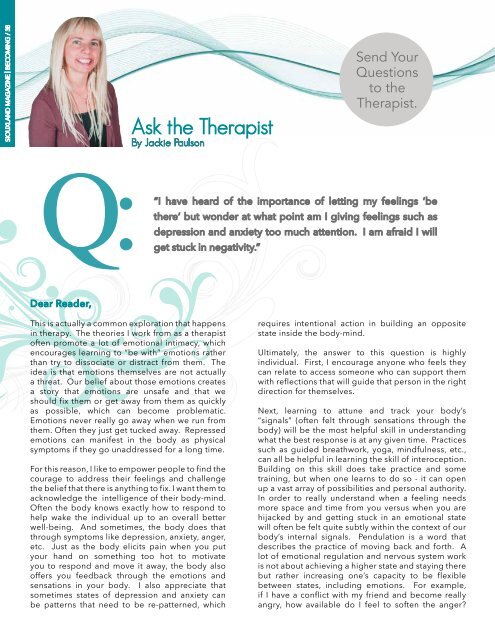Siouxland Magazine - Volume 5 Issue 3
Create successful ePaper yourself
Turn your PDF publications into a flip-book with our unique Google optimized e-Paper software.
<strong>Siouxland</strong> <strong>Magazine</strong> | BeComing / 38<br />
Ask the Therapist<br />
By Jackie Paulson<br />
Send Your<br />
Questions<br />
to the<br />
Therapist.<br />
have heard of the importance of letting my feelings ‘be<br />
there’ but wonder at what point am I giving feelings such as<br />
depression and anxiety too much attention. I am afraid I will<br />
Q:“I<br />
get stuck in negativity.”<br />
Dear Reader,<br />
This is actually a common exploration that happens<br />
in therapy. The theories I work from as a therapist<br />
often promote a lot of emotional intimacy, which<br />
encourages learning to “be with” emotions rather<br />
than try to dissociate or distract from them. The<br />
idea is that emotions themselves are not actually<br />
a threat. Our belief about those emotions creates<br />
a story that emotions are unsafe and that we<br />
should fix them or get away from them as quickly<br />
as possible, which can become problematic.<br />
Emotions never really go away when we run from<br />
them. Often they just get tucked away. Repressed<br />
emotions can manifest in the body as physical<br />
symptoms if they go unaddressed for a long time.<br />
For this reason, I like to empower people to find the<br />
courage to address their feelings and challenge<br />
the belief that there is anything to fix. I want them to<br />
acknowledge the intelligence of their body-mind.<br />
Often the body knows exactly how to respond to<br />
help wake the individual up to an overall better<br />
well-being. And sometimes, the body does that<br />
through symptoms like depression, anxiety, anger,<br />
etc. Just as the body elicits pain when you put<br />
your hand on something too hot to motivate<br />
you to respond and move it away, the body also<br />
offers you feedback through the emotions and<br />
sensations in your body. I also appreciate that<br />
sometimes states of depression and anxiety can<br />
be patterns that need to be re-patterned, which<br />
requires intentional action in building an opposite<br />
state inside the body-mind.<br />
Ultimately, the answer to this question is highly<br />
individual. First, I encourage anyone who feels they<br />
can relate to access someone who can support them<br />
with reflections that will guide that person in the right<br />
direction for themselves.<br />
Next, learning to attune and track your body’s<br />
“signals” (often felt through sensations through the<br />
body) will be the most helpful skill in understanding<br />
what the best response is at any given time. Practices<br />
such as guided breathwork, yoga, mindfulness, etc.,<br />
can all be helpful in learning the skill of interoception.<br />
Building on this skill does take practice and some<br />
training, but when one learns to do so - it can open<br />
up a vast array of possibilities and personal authority.<br />
In order to really understand when a feeling needs<br />
more space and time from you versus when you are<br />
hijacked by and getting stuck in an emotional state<br />
will often be felt quite subtly within the context of our<br />
body’s internal signals. Pendulation is a word that<br />
describes the practice of moving back and forth. A<br />
lot of emotional regulation and nervous system work<br />
is not about achieving a higher state and staying there<br />
but rather increasing one’s capacity to be flexible<br />
between states, including emotions. For example,<br />
if I have a conflict with my friend and become really<br />
angry, how available do I feel to soften the anger?

















